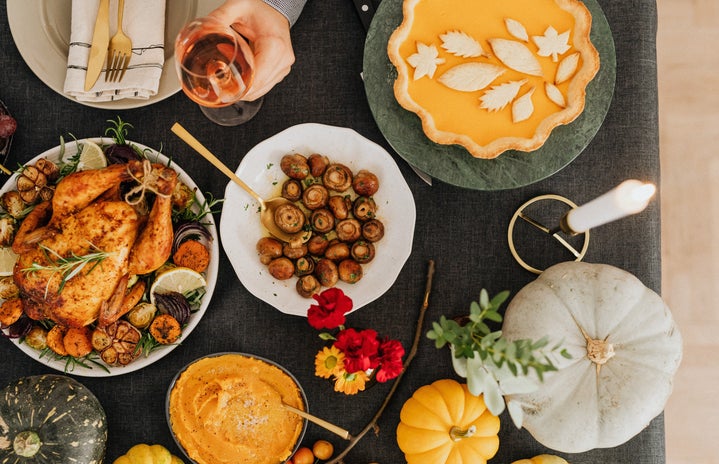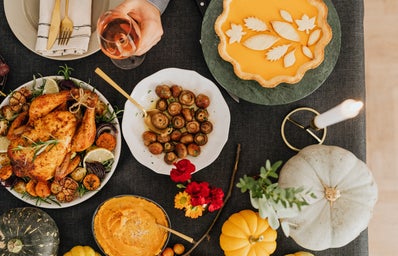So many Americans love Thanksgiving — it’s a holiday that reminds them of the warm hugs of their relatives, the kitchen aromas continuously landing on their tongues, the rich background of red leaves decorating the window panes…
While Thanksgiving can be an amazing holiday, its emphasis on overindulgence and feasting can have toxic effects, especially on people who suffer from negative body image, disordered eating, or eating disorders. The focus on overeating — also known as the “Thanksgiving coma” — can cause pervasive feelings of anxiety, shame, or self–loathing in people who already struggle to develop a healthy relationship with food.
This all also occurs within the harmful context of America’s notorious diet culture, which focuses more on body aesthetics and calorie counting than intuitive eating and health–based exercise. And with well–intentioned relatives who can be prone to fat shaming or policing others’ food intake, Thanksgiving can become more stressful.
But this year can be different. This year, we can collectively empower ourselves to embrace our bodies and eat a satisfying Thanksgiving meal. Here are ten tips to maintain a healthy sense of body positivity during Thanksgiving.
Try not to exclude foods from your diet because of shame
Play the devil’s advocate to that toxic voice inside your head! When you prove to yourself that you’re capable of eating both “healthy” and “unhealthy foods,” you’re indirectly invalidating negative thoughts in your subconscious. This creates positive memories in your brain that are associated with healthy eating and self–moderation — and your brain relies on that memory as a template going forward.
Maintain your exercise routine
Elle Woods from Legally Blonde said it — “Exercise gives you endorphins. Endorphins make you happy.” Exercising, no matter what the time of year, has countless health benefits for your body and mind.
While you should NOT exercise to avoid guilt about eating at Thanksgiving, you should maintain your regular exercise routine to feel mentally and physically healthy. There’s no better feeling than relishing that post–workout high, the coolness of the water, and a genuine feeling of ease in your body.
Wear what makes you feel confident
Confidence can look like sweats and a sweatshirt, or it can look like a slim crop–top and tight jeans. It doesn’t matter what you wear — what matters is how you feel about yourself in the context of the holidays. When your clothing makes you feel more confident about your body, this helps mitigate any feelings of guilt or anxiety when eating at Thanksgiving.
Call out anyone who makes fatphobic, appearance–based, or diet centered comments
You don’t have room for any toxicity in your life! To someone who struggles with an eating disorder or body image, any comment about appearance can be interpreted as an insult.
Comments about dieting can also trigger people who have suffered or currently suffer from disordered eating. And naturally, when someone makes fatphobic comments about “unhealthy” food (“I’m going to get so fat from this,” “I’ll need to trim down after this meal,” “I don’t know if you should be eating that,” etc.), the other table members are less inclined to enjoy the food — which undermines the entire purpose of sharing a delicious meal at Thanksgiving.
Drink plenty of water
Like exercising, the health benefits of water are countless: boosting skin health and beauty, regulating body temperature, maintaining blood pressure, and maximizing your overall energy levels. Drinking water will also help alleviate any feelings of bloating or heaviness that may come with eating a big meal.
focus on the conversation
Thanksgiving is a family–centered holiday — the more time you spend getting to know your family members better and enjoying the conversation, the less self–conscious you’ll be about the food you’re eating. Take the time to mindfully enjoy the company of your family members during a unique time of year when everyone is gathered together. This will train your brain to associate Thanksgiving with feelings of family–based joy, rather than anxiety or self–consciousness.
make a list of why you’re grateful for your body
This may sound time–consuming, but every additional item on your list is worthwhile. The more you tell your brain to perceive your body as a symbol of physical health, the less concerned you’ll be about the specific aspects of your body image. This will help you approach every situation with a more confident and accepting mindset. It will help you recognize that while you can’t love every physical aspect of your body, you should always appreciate what your body can do for you.
Avoid weighing yourself the days before or after
Even if you’re curious, do not weigh yourself before or after Thanksgiving. If you’re looking for a flaw or any sort of perceived change in your weight, you’re probably going to find one — regardless of the reality. As a general rule, weighing yourself a maximum of once per week is recommended by most medical professionals, and this is especially true around holidays, when there is an uptick in disordered eating and negative body image.
limit your social media use to ten minutes a day
As a general rule, social media has negative mental health effects for its users: lowered self–esteem, social anxiety, depression, and other symptoms of mood disorders. Of course, it can be fun to check out your friends’ pictures of Thanksgiving meals every now and then — just remain aware of how much time you’re spending scrolling through other people’s stories.
Above all, don’t forget that every photo is still a filtered version of reality, and you shouldn’t subconsciously or consciously try to raise yourself to unrealistic standards. Social media is a culture obsessed around perfectionism — you have no need for that in your life, especially not around the holidays.
Eat however is best for your body
At the end of the day, no one understands your body better than you do. This means you decide the course of your Thanksgiving — you can have a big meal, or you can have a snack before. Similarly, you can stick to your normal food categories or experiment with whatever looks appetizing. Don’t feel any pressure to eat differently than you normally would or eat in a way that causes you anxiety — Thanksgiving meals are all about eating what makes you and your body feel satisfied, mainly while enjoying the company of beloved relatives.
And there’s the list! I hope this helps. You got this, and Happy Thanksgiving :)

